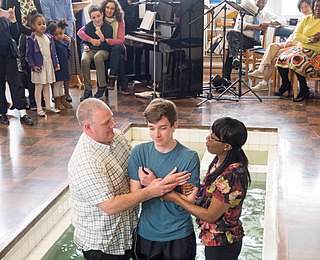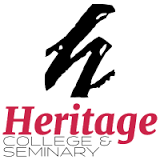
Congregational churches are Protestant churches in the Calvinist tradition practising congregationalist church governance, in which each congregation independently and autonomously runs its own affairs.

The Holiness movement is a Christian movement that emerged chiefly within 19th-century Methodism, and to a lesser extent other traditions such as Quakerism, Anabaptism, and Restorationism. The movement is Wesleyan in theology, and is defined by its view of personal sin, and emphasis on the doctrine of a second work of grace generally called entire sanctification or Christian perfection. For the Holiness Movement "the term 'perfection' signifies completeness of Christian character; its freedom from all sin, and possession of all the graces of the Spirit, complete in kind." A number of evangelical Christian denominations, parachurch organizations, and movements emphasize those beliefs as central doctrine.
The Church of the United Brethren in Christ is an evangelical Christian denomination with churches in 17 countries. It is Protestant, with an episcopal structure and Arminian theology, with roots in the Mennonite and German Reformed communities of 18th-century Pennsylvania, as well as close ties to Methodism. It was organized in 1800 by Martin Boehm and Philip William Otterbein and is the first American denomination that was not transplanted from Europe. It emerged from United Brethren churches that were at first unorganized, and not all of which joined this church when it was formally organized in 1800, following a 1789 conference at the Otterbein Church.
The Bible Fellowship Church is a conservative pietistic Christian denomination with Mennonite roots.

The Evangelical Covenant Church (ECC) is a Radical Pietistic denomination with Lutheran roots in the evangelical Christian tradition. The denomination has 129,015 members in 878 congregations and an average worship attendance of 219,000 people in the United States and Canada with ministries on five continents. Founded in 1885 in North America by Swedish immigrants, the church is now one of the most rapidly growing and multi-ethnic denominations on the continent. Historically Lutheran in theology, piety and background, it is now a broadly evangelical movement.
The National Association of Evangelicals (NAE) is an association of evangelical denominations, organizations, schools, churches and individuals, member of the World Evangelical Alliance. The association represents more than 45,000 local churches from nearly 40 different denominations and serves a constituency of millions. The mission of the NAE is to honor God by connecting and representing evangelicals in the United States.

The Alliance World Fellowship is the international governing body of the Christian and Missionary Alliance. The Alliance is an evangelical Protestant denomination within the Higher Life movement of Christianity, teaching a modified form of Keswickian theology. The headquarters is in São Paulo, Brazil.
Tyndale University is a Canadian private interdenominational evangelical Christian university in Toronto, Ontario, which offers undergraduate and graduate programs. Tyndale students come from over 40 different Christian denominations.

Covenant Theological Seminary, sometimes known as Covenant Seminary, is the denominational seminary of the Presbyterian Church in America (PCA) and it is located in Creve Coeur, Missouri. Covenant trains leaders for work in the church and the world — especially as pastors, missionaries, and counselors. It does not require all students to be members of the PCA, but it is bound to promote the teachings of its denomination. Faculty must subscribe to the system of biblical doctrine outlined in the Westminster Standards.

The conservative holiness movement is a loosely defined group of theologically conservative Christian denominations with the majority being Methodists whose teachings are rooted in the theology of John Wesley, and a minority being Quakers (Friends) that emphasize the doctrine of George Fox, as well as River Brethren who emerged out of the Radical Pietist revival, and Holiness Restorationists in the tradition of Daniel Sidney Warner. Schisms began to occur in the 19th century and this movement became distinct from parent Holiness bodies in the mid-20th century amid disagreements over modesty in dress, entertainment, and other "old holiness standards" reflective of the related emphases on the Wesleyan–Arminian doctrine of outward holiness or the Quaker teaching on the testimony of simplicity or the River Brethren and Restorationist teachings on nonconformity to the world, depending on the denomination. Christian denominations aligned with the conservative holiness movement share a belief in Christian perfection, though they differ on various doctrines, such as the celebration of the sacraments and observance of ordinances, which is related to the denominational tradition—Methodist, Quaker, Anabaptist or Restorationist. Many denominations identifying with the conservative holiness movement, though not all, are represented in the Interchurch Holiness Convention; while some denominations have full communion with one another, other bodies choose to be isolationist.
A Bible college, sometimes referred to as a Bible institute or theological institute, is an evangelical Christian or Restoration Movement Christian institution of higher education which prepares students for Christian ministry with theological education, Biblical studies and practical ministry training.

Baptists in Canada have a rich heritage and background. United Empire Loyalists and more recent arrivals from England and the U.S. formed the core and foundation of the Baptist denomination in Canada.

The Evangelical Christian Church(Christian Disciples) as an evangelical Protestant Canadian church body in North America (2004) can be traced to the formal organization of the Christian Church in 1804, in Bourbon County, Kentucky under the leadership of Barton Warren Stone (1772–1844). The Stone Movement later merged with the efforts of Thomas Campbell (1772–1854) and his son Alexander Campbell (1788–1866) to become the Restoration Movement that gave birth to the Churches of Christ (Non-Instrumental), the Christian churches and churches of Christ, the Churches of Christ (non-institutional), and the Disciples of Christ. The Evangelical Christian Church as a separate group within the Restoration tradition was reorganized in 2001. The Evangelical Christian Church's national office in Canada is in Waterloo, Ontario.
The Christian Holiness Partnership is an international organization of individuals, organizational and denominational affiliates within the holiness movement. It was founded in 1867 as the National Camp Meeting Association for Christian Holiness, later changing its name to the National Holiness Association, by which it was known until 1997, when its current name was adopted. Its stated purpose is to promote "the message of scriptural holiness" primarily through evangelistic camp meetings. The Christian Holiness Partnership is headquartered in Clinton, Tennessee.
The Evangelical Church of North America (ECNA) is a Wesleyan-Holiness, Protestant Christian denomination headquartered in Clackamas, Oregon. As of 2000, the Church had 12,475 members in 133 local churches. The Church sponsors missionaries in seven countries.
The Churches of Christ in Christian Union (CCCU) is a Wesleyan-Holiness and Restorationist Christian denomination.

The Heritage College & Seminary is a Baptist theological institute in Cambridge, Ontario, Canada. It is affiliated with the Fellowship of Evangelical Baptist Churches in Canada.
The Apostolic Church of Pentecost (ACOP) is a Pentecostal Christian denomination with origins in the Pentecostal revival of the early 20th century. Although multi-national, ACOP has its strongest membership in Canada. In 2002 ACOP reported "approximately 24,000 members in Canada, with 450 ministers and 153 churches." There are ACOP churches in all the provinces of Canada. ACOP's headquarters is in Calgary, Alberta.
Centre Street Church is an evangelical megachurch located in Calgary, Alberta, Canada, affiliated with the Evangelical Missionary Church of Canada (EMCC). Founded in 1958, it has an average weekly attendance of 7,739 and is considered the largest megachurch in Canada. In addition to its Central Campus, it has four satellite locations in the Calgary Metropolitan Region. Its senior pastor is Dr. Henry Schorr.








